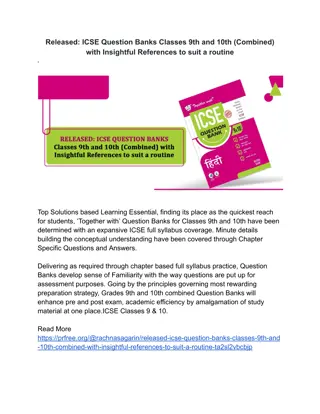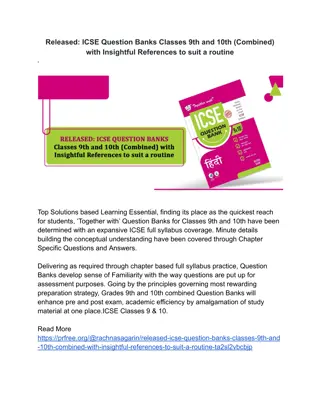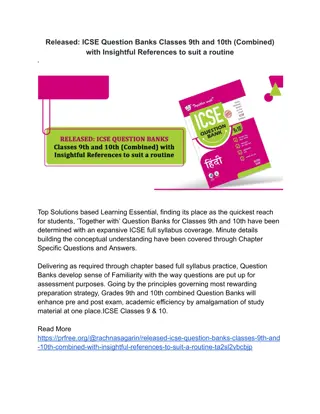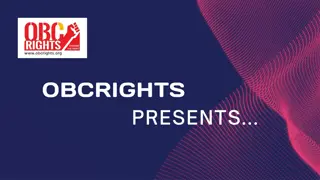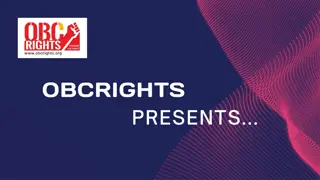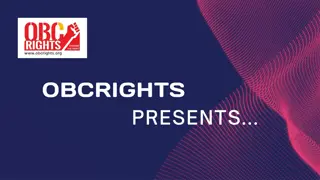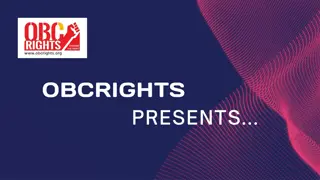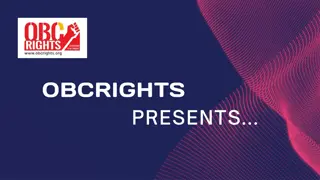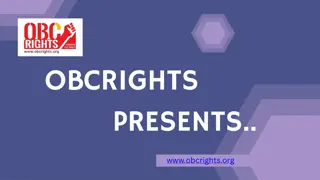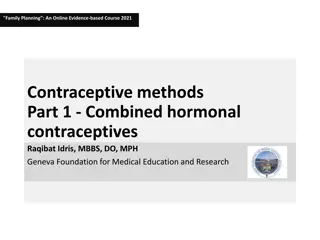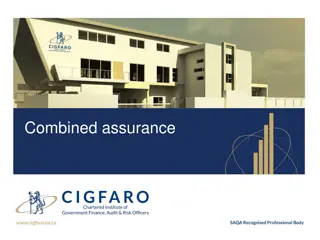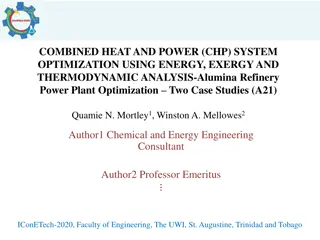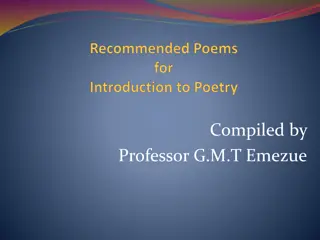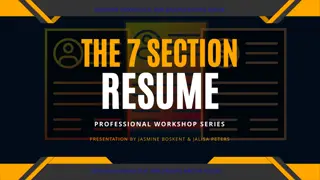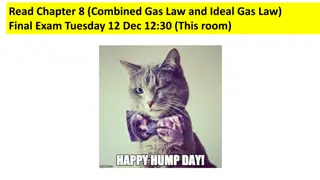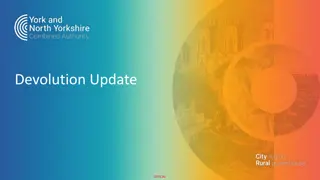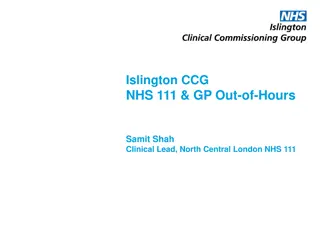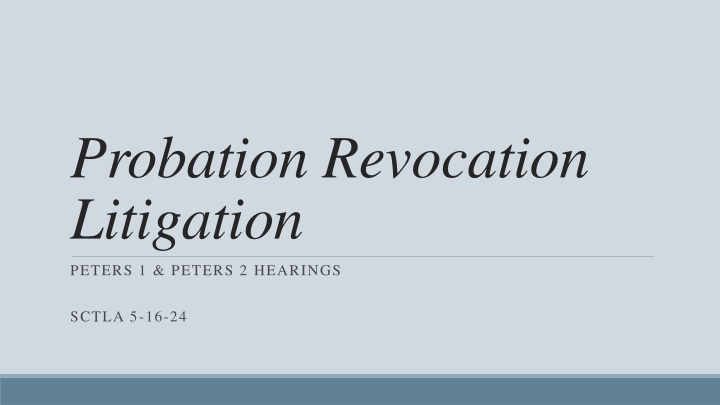
Understanding Probation Revocation and Legal Procedures
This insightful content delves into the topic of probation revocation, discussing the challenges and considerations involved in cases where individuals on post-conviction release commit new offenses. It highlights the importance of balancing rehabilitation with community safety and addresses the nuances of revocation procedures. Key cases and judicial opinions provide valuable insights into the legal framework surrounding probation and parole revocation.
Uploaded on | 0 Views
Download Presentation

Please find below an Image/Link to download the presentation.
The content on the website is provided AS IS for your information and personal use only. It may not be sold, licensed, or shared on other websites without obtaining consent from the author. If you encounter any issues during the download, it is possible that the publisher has removed the file from their server.
You are allowed to download the files provided on this website for personal or commercial use, subject to the condition that they are used lawfully. All files are the property of their respective owners.
The content on the website is provided AS IS for your information and personal use only. It may not be sold, licensed, or shared on other websites without obtaining consent from the author.
E N D
Presentation Transcript
Probation Revocation Litigation PETERS 1 & PETERS 2 HEARINGS SCTLA 5-16-24
In Re A.W.: J. Nebeker concur. The American society in general, and this jurisdiction in particular, suffers from repetitive criminal acts by malefactors who are on one form or another of post-conviction release. Too often those criminals are on probation or parole granted out of unrealistic or wishful thinking that such release is in the best interest of rehabilitation. Too often, either the safety of the community is ignored in making such judgments or it is put at such low priority as to be insulting to an ordered society.
A bit more concern: A.W.'s probation officer reported favorably on his probationary performance on the question of release in this case. This is incredible, particularly after the first arrest for tampering. It is also consistent with the shocking and lethargic attitude revealed in the probation officer's failure to seek revocation of probation. It would also seem that the prosecution ought to take action to initiate revocation proceedings.
Judge Greene: US v. Peters Concern has not infrequently been expressed about the fact that no action is taken by the authorities when individuals on probation or parole are rearrested for new offenses. On the other hand, it has been suggested by some that probation or parole should never be revoked on the basis of the alleged commission of a new offense until after a criminal trial for and conviction of that offense, and that in the meantime -- for weeks or months -- the probationer or parolee must be permitted to remain at large.
J Greenes reasoning: It is established that a mere arrest for a subsequent offense cannot justify revocation of probation. See United States v. Webster, 161 U.S.App.D.C. 1, 492 F.2d 1048, 1051 (1974), where the court said that "It is not a ground for revocation that a probationer has merely been charged with a crime; on the other hand, it is not necessary that the ground be that the probationer has been convicted of a crime. Correctly stated, the issue is whether he committed a crime."
Morrissey v. Brewer two hearings must be held before parole may be revoked: an initial hearing, to determine "whether there is probable cause or reasonable ground to believe that the arrested parolee has committed acts which would constitute a violation of parole conditions", and a final hearing, to determine whether the violation occurred, and if so, whether revocation is warranted.
DC Crim R 32.1-Peters 1 (a)(1) Prelim Hearing (A) whether there is probable cause to believe that a violation occurred (B) notice of hearing, allegation and right to counsel Opp to be heard and present evid Opp to XX adverse Ws Prelim in new case may serve as prelim in probation case (C) pc may be based on hearsay
DC Crim R 32.1-Peters 2 (2) Revocation Hearing. Unless waived by the person, the court must hold the revocation hearing within [60 days]. The person is entitled to:(A) written notice of the alleged violation; (B) disclosure of the evidence against the person; (C) an opportunity to appear, present evidence, and question any adverse witness unless the court determines that the interest of justice does not require the witness to appear; and (D) notice of the person s right to retain counsel or to request that counsel be appointed if the person cannot obtain counsel; and (E) an opportunity to make a statement and present any information in mitigation.
Rev Hearing Proc Rights: Harris v. US, 612 A.2d 198 (DC 1992) Standard of proof: preponderance Admissible: reliable hearsay with recognized indicia of reliability info in probation violation reports, reliable prima facie evidence -drug test reports Colter v. US, 392 A.2d 994 (DC 1978) Advance notice of claimed viols required
Timing? Peters 1 prelim If held in C 10 on a 5 day hold w/ notice provided prelim in new case = pc in the Peters 1 if PC detention unless clear & convincing evid not a flight [like 1325b] risk or danger Peters 2 rev hrng If held, within 60 days after the detention hearing, or be relsd Can be tolled by D until final resolution of new charge
What Does this Mean for Lawyers?
The whole point of the Peters line of cases is that there is a procedural means should be available which will provide adequate protection to the community, while at the same time ensuring the probationer's right to a fair revocation proceeding. In the Matter of A. W, 353 A.2d 686, 688 (D.C. 1976)
If your client is held-ask for an initial preliminary hearing to determine probable cause. When to Ask for a Peters I hearing. A finding of probable cause by a preliminary hearing judge suffices if the violation is a new arrest. If its just technical violations, ask for a preliminary hearing. If your client is not detained pending the show cause, you don t get the preliminary hearing. Smith v. United States, 474 A.2d 1271 (D.C. 1983).
What and How to Prepare Rule 32.1gives you: The court must give the person: (i) notice of the hearing and its purpose, the alleged violation, and the person s right to retain counsel or to request that counsel be appointed if the person cannot obtain counsel; (ii) an opportunity to appear at the hearing and present evidence; and (iii) upon request, an opportunity to question any adverse witness. Whenever the alleged violation of probation is based on an arrest for a criminal offense allegedly committed while on probation, a preliminary hearing held pursuant to Rule 5.1 may serve as the preliminary revocation hearing required by this subparagraph if the provisions of this subparagraph have been fully satisfied.
You can ask for a hearing anytime probation is going to be revoked. When to Ask for a Peters II hearing If your client is held the Rule 32.1(a)(3) says that the hearing has to be in 60 days. You can waive that if the revocation is based on a new arrest, and you want for the new case to resolve. Even if your client is not detained you get a hearing.
What and How to Prepare Rule 32.1gives you: (A) written notice of the alleged violation; (B) disclosure of the evidence against the person; (C) an opportunity to appear, present evidence, and question any adverse witness unless the court determines that the interest of justice does not require the witness to appear; and (D) notice of the person's right to retain counsel or to request that counsel be appointed if the person cannot obtain counsel; and (E) an opportunity to make a statement and present any information in mitigation
Whats Being Decided and How? The question at a Peters II hearing is if a violation occurred. For all kinds of violations, the standard is preponderance of the evidence. Harris v. United States, 612 A.2d 198 (D.C. 1992). The DCCA has said that these hearing are more akin to administrative hearings so lots of things, like affidavits, letters, reports are admissible. The only real standard is that evidence must be reliable. Thompson v. United States, 444 A.2d 972, 974 (D.C. 1982).
Why Are We Doing This? You're making a record Whether to revoke is discretionary Sentencing

